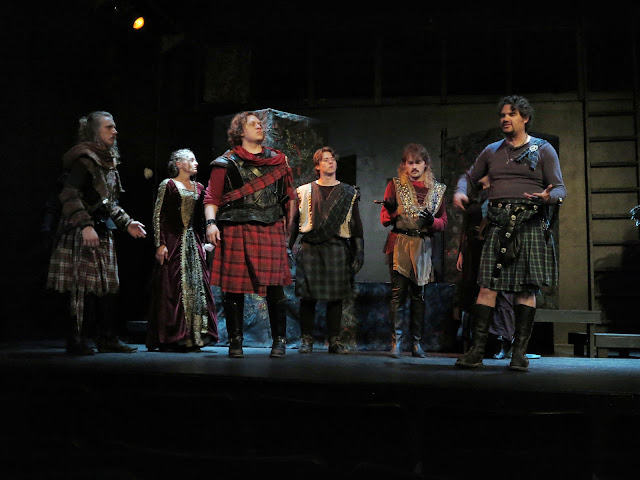Macbeth Redux
Written by William Shakespeare
Adapted and directed by Kathy Curtiss
410 W 42 St., Manhattan, NYC
August 17-20, 2022
 |
| Zachary Ballard (Macbeth) and Adam Argyle (Macduff). Photo by Jonathan Slaff. |
Unlike many recent productions of Shakespeare's Macbeth, Renaissance Now Theatre & Film's Macbeth Redux, adapted and directed by company's Artistic Director Karthy Curtiss, not only preserves but leans into its medieval Scottish setting, including in some wonderfully atmospheric use of Celtic music and song (the hauntingly lovely vocal performance by Keely Conrad, who also plays one of the witches, deserves special mention in that respect). While this backdrop might seem more traditional, Macbeth Redux features no shortage of transformative choices in its vibrant re-envisioning of this oft-adapted play. The most prominent change, in some ways, is the addition of dialogue in contemporary prose. These additions, most of which occur in the first two thirds of the production, primarily foreground some of the play's themes–free will, fate, power, the role of magic, and so on–and the perspectives of the lower status characters, as when Ross (Stephano Puertas) and Angus (Mason Tarwater) discuss being the "little guy" in these momentous state struggles and who they would rather follow as their leader. The effect is, enjoyably, something like getting a perspective on the play from within the play. Another addition offers a satisfyingly original solution to the problem posed by Lady Macbeth's (Mira Kocherhans) mention of having suckled an infant. |
| The discovery of the murder. Photo by Jonathan Slaff. |
Shakespeare Redux makes intriguing adjustments to the original text as well. Those familiar with Macbeth will notice, for example, that Banquo's son Fleance is played a bit differently than usual, and, more impactfully for thinking about the play as a whole, that Lady Macbeth gets a little more involved in safeguarding her and her husband's advancement, which also leads to a great small moment with a reassigned line at the beginning of the banquet scene. In another effective example, some of the dialogue of Lady Macduff's (Olympia Pead) precocious son assumes a taunting dimension in the mouth of her murder instead (a very good Gavin Henry).
 |
| Above: Vision of Malcolm (Jacob Thomason). Below: Keely Conrad (Witch), Olivia Casper (Hecate), Dorsey Williams (Witch), Olympia Pead (Witch). Photo by Jonathan Slaff. |
The production gives us a younger, physically powerful Macbeth in Zachary Ballard, and he and Anton Moss, in a terrific turn as Banquo (and his ghost), make palpable the affectionate friendship between the pair, giving additional weight to its pivotal betrayal. Ross and Angus raise the idea of being made confidantes, and Ballard's Macbeth frequently makes confidantes of the audience, kneeling at the front edge of the stage, for instance, to deliver lines. His is a very human tyrant, struggling with the armor which he has called for and fighting, the effort playing out on his face, to contain his emotions when he hears of his queen's fate. Kocherhans memorably embodies that queen in her descent from resolve into madness, and the rhythm of tension and release in the scene in which Lady Macbeth argues for Macbeth to take the murderous initiative exemplifies the charged but natural dynamic which she and Ballard establish.
 |
| Mira Kocherhans (Lady Macbeth) and Zachary Ballard (Macbeth). Photo by Jonathan Slaff. |
The production conjures some impressive images, filling its spare, impressionistic set with slow-motion battles, accomplished fight choreography, and, especially in the banquet scene, some almost painterly visual composition. Details like ghostly Banquo's acknowledgement of his king, the implicit comparison made by Hecate's (Olivia Casper) coronet to the play's other crown-wearing characters, and the doubling of the witches' staves as the Birnam boughs lend a richness to the texture of the show's world and themes. Novices and veterans of Shakespeare's Scottish play alike will find much to admire, as well as much to ponder, in
Macbeth Redux.
-John R. Ziegler and Leah Richards







Comments
Post a Comment